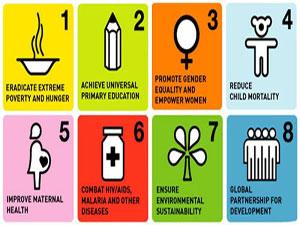Fighting poverty, tracking the Millennium Development Goals
This story was originally covered by PRI's The Takeaway. For more, listen to the audio.
The world's leaders are meeting in New York this week, to discuss the progress of the Millennium Development Goals, established in 2000. If the goals are achieved by the 2015 target, the UN says, "world poverty will be cut by half, tens of millions of lives will be saved, and billions more people will have the opportunity to benefit from the global economy." These goals include:
1. Eradicate extreme Poverty and Hunger
2. Achieve universal primary education
3. Promote gender equality and empower women
4. Reduce Child Mortality Rate
5. Improve maternal health
6. Combat HIV/AIDS, malaria, and other diseases
7. Ensure environmental sustainability
8. Develop a global partnership for development
Today, questions remain about how much progress the world has made on the eight goals. "I think the millennium development goals set an agenda that really sort of concentrated the attention of governments across the world," Michael Klosson, the Vice President of Policy and Humanitarian Response for Save the Children, told PRI's The Takeaway. The goals have shown: "Progress is possible, it's mixed and more needs to be done."
The goals have also created more accountability for aid workers and people fighting poverty, according to Klosson. Benchmarks were set that allow people to track progress and hold people accountable. "As long as you have plans, you have a focus on results and outcomes," Klosson says, "you can achieve all of these goals."
At the same time, Klosson acknowledges that what matters most is what happens in the field and in developing countries, not what happens during New York City summits. The BBC's Mike Wooldridge spoke with a number of people in Uganda who believe the Millennium Development Goals, and the Millennium Development Villages, are making progress on some of the world's most difficult problems.
The idea behind the Millennium Development Villages is to choose areas in developing countries and flood those areas with aid, so that eventually, the people won't need aid anymore. "I think we have done our job of getting the lessons out. We have done our job in sharing these lessons with government," a health program organizer told Wooldridge. "I'll be disappointed if these good lessons are not replicated. But I have a hope that that is going to happen."
Klosson believes it's important for everyone to get involved with these goals. "It's very important, and civil society needs to hold government's feet to the fire," he says. "We all need to pull together in this direction, because it can be done."
